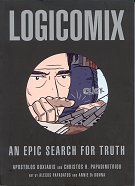Uncle Petros is dismissed as a failure by his family. His nephew is curious to find out why, and as he investigates, he discovers something remarkable: Petros was once a mathematical genius bent on proving Goldbach's Conjecture? What happened to make him end up a virtual hermit?
This is a lovely story, with some great twists along the way. The middle third is structured like a rather chatty mathematical biography -- indeed at least one of the incidents is lifted straight from a story by Hardy (acknowledged in a tongue-in-cheek footnote). It's about the marvelous beauty of mathematics, about what are suitable goals in life, about what constitutes failure, and about the courage of achievement.

